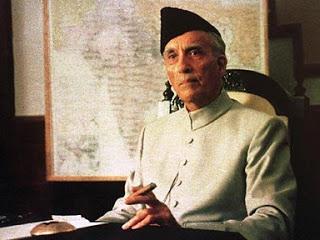 Biopics of national heroes are dicey propositions, especially those of a country as contentious as Pakistan. Jinnah (1998) suffered from funding and distribution issues and poor press over Christopher Lee's casting, barely meriting a release. Recently shown on Turner Classics Movies, it's an oddly staged depiction of Pakistan's birth.
Biopics of national heroes are dicey propositions, especially those of a country as contentious as Pakistan. Jinnah (1998) suffered from funding and distribution issues and poor press over Christopher Lee's casting, barely meriting a release. Recently shown on Turner Classics Movies, it's an oddly staged depiction of Pakistan's birth.Mohammed Ali Jinnah (Christopher Lee) dies in 1948, shortly after Pakistan gains independence. He's met in the afterlife by the Narrator (Shashi Kapoor), who revisits key points in Jinnah's life to determine his fate. Jinnah evolves from enthusiastic member of India's National Congress to an advocate for Muslim independence, demanding partition. Betrayed by Hindu nationalists and Lord Mountbatten (James Fox), Jinnah struggles to keep his new country afloat.
Director Jamil Dehlavi mounts a strange production veering between epic and fantasy. There are impressively rendered recreations of riots and communal massacres, along with detailed dissections of Anglo-Indian politics. But Dehlavi indulges in a Brechtian framing device, with his heavenly Narrator fussing over computers and older Jinnah debating his younger self (Richard Lintern). It culminates in a supernatural trial where Mountbatten stands condemned of India's tragedy.
This marks Jinnah's other obvious shortcoming. Besides Jinnah and his devoted sister Fatima (Shireen Shah), other players in India's independence and partition are largely caricatures. Dehlavi makes an exception for Gandhi (Sam Dastor), portrayed as both sincere idealist and shrewd politician. But Nehru (Robert Ashby) is a blowhard more interested in bedding Lady Mountbatten (Maria Aitken) than politics, while Lord Dickie is a preening dunce. Admittedly, these portrayals aren't worse than Jinnah's own in Gandhi.
Naturally, Jinnah presents its hero in the most flattering light. He agitates for partition out of sincere concern for India's Muslim minorities, annoyed by the Congress Party's Hindu chauvinism, a beacon of peace who berates Islamic fanatics and upholds women's rights. As with other Great Men of Cinema, his only shortcomings are diffidence towards his family, whether his Parsi wife (Indira Varma) or headstrong daughter (Vaneeza Ahmed). At film's end he achieves deification, as a crowd of Muslim refugees welcome his spirit's entry into their midst.
Christopher Lee's casting caused qualms on racial grounds but his performance is quite effective. He plays Jinnah with rectitude and gravitas, a compelling national hero. Richard Lintern's younger Jinnah offers respectable counterpart. Shireen Shah offers compelling support, though James Fox and Maria Aitken often seem like cartoons. Indira Varma makes a strong impression in her brief, tragic appearance.
Jinnah isn't notably better or worse than most biopics. Pakistan's entitled to myths and heroes as much as any nation, even if its veering between Islamic fanaticism, military despotism and occasional tries at democracy betrayed its founder's vision. Still, the movie's more intriguing curio than overlooked classic.

